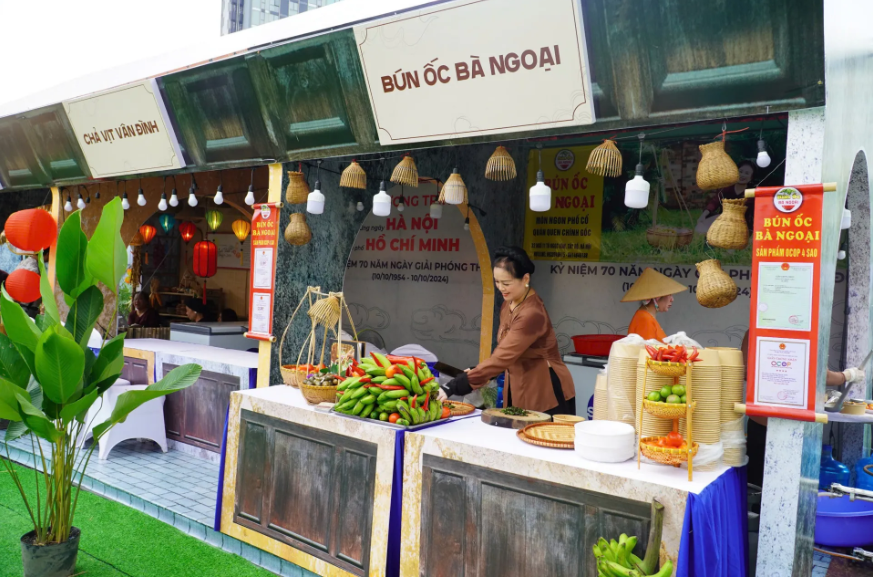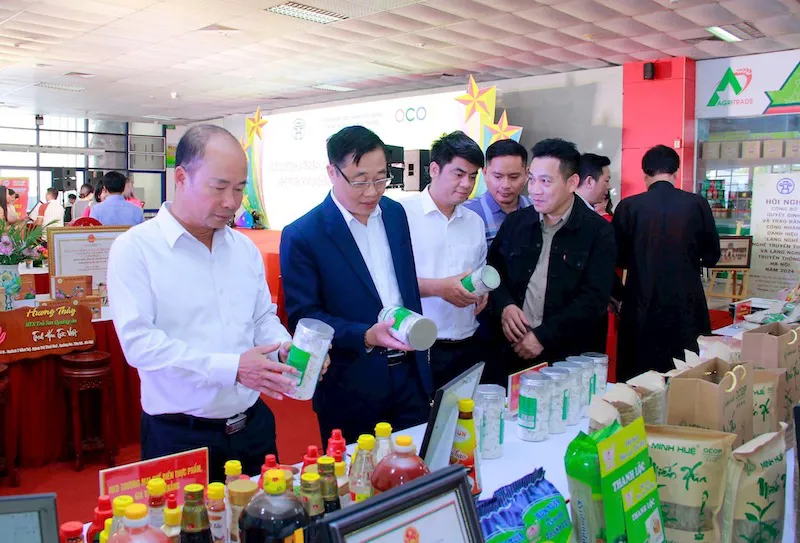Hanoi honors 14 craft villages contributing to OCOP growth
Hanoi advances cultural heritage and rural economy by certifying OCOP products and supporting traditional crafts through its village recognition program.
THE HANOI TIMES — Hanoi has recognized 14 traditional craft villages to preserve cultural heritage and promote local economic development through the One Commune One Product (OCOP) program.

A booth displaying Hanoi's OCOP items in a trade fair in Ho Chi Minh City in August 2024. Photo: Huy Chuong/The Hanoi Times
The recognition was given by the Hanoi Department of Agriculture and Environment during a ceremony held in Hanoi on April 15, which also celebrated OCOP's high-quality products.
In 2024, the Hanoi People’s Committee approved the titles of “Hanoi Craft Village,” "Traditional Craft," and "Traditional Craft Village" for 14 villages in the capital, including Van An Carpentry Village in Son Dong Commune, Son Tay City, Hat Mon Carpentry Village in Hat Mon Commune, Phuc Tho District, and Chung Chan Tailoring Village in Van Tu Commune, Phu Xuyen District.
The title of “Hanoi Traditional Craft Village” was granted to Co Chat Embroidery Village in Dung Tien Commune of Thuong Tin District, along with the leather footwear villages of Gie Ha and Gie Thuong in Phu Yen Commune of Phu Xuyen District, and the lotus tea-infusing village of Quang Ba in Quang An Ward of Tay Ho District.
Seven other traditional crafts were also recognized, including green sticky rice products from Hang Than Street in Nguyen Trung Truc Ward of Ba Dinh District, bronze casting in Ngu Xa of Truc Bach Ward, flute kite-making in Ba Duong Noi Village of Hong Ha Commune in Dan Phuong District, fine jewelry and silver filigree from Dinh Cong Ward in Hoang Mai District, tofu production in Mai Dong Ward, green sticky rice making in Vong Village of Dich Vong Hau Ward in Cau Giay District, and lotus tea-infusing in Quang An Ward of Tay Ho District.
At the ceremony, the department certified 108 OCOP products from 33 manufacturers, each rated four stars or candidates for five stars.
The capital currently leads the country with more than 3,300 certified OCOP products, accounting for 21.3% of the national total.
Nguyen Dinh Hoa, Deputy Director of Hanoi's Department of Agriculture and Environment, said the city will host regular trade fairs, product showcases, OCOP weeks, and innovation events to provide greater visibility and commercial opportunities for local producers.

Delegates visit a booth displaying OCOP products. Photo: Hanoimoi Newspaper
In 2025, Hanoi plans to develop at least 30 five-star OCOP candidates. The city also plans to work with the World Crafts Council to help at least two more of Hanoi's craft villages join the Global Network of Creative Craft Cities.
Hanoi will continue implementing the city's master plan for craft village development in 2025-2030 with a vision to 2050. Specifically, the city’s Department of Agriculture and Environment has encouraged local authorities to support traditional craft villages by linking them to OCOP product development and craft tourism. The move helps transform these villages into experiential tourism destinations that highlight Hanoi’s artisanal identity.
Meanwhile, producers are encouraged to enhance product quality, improve design and packaging, apply technology, and diversify digital marketing to increase consumer appeal, create jobs, and raise artisan incomes












